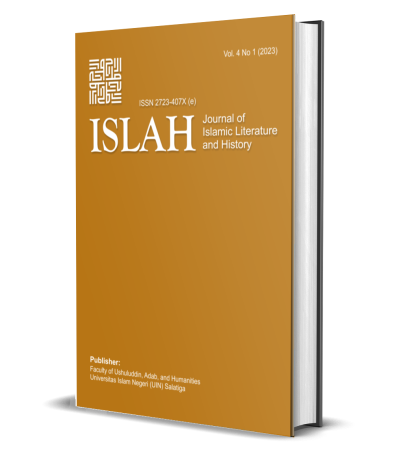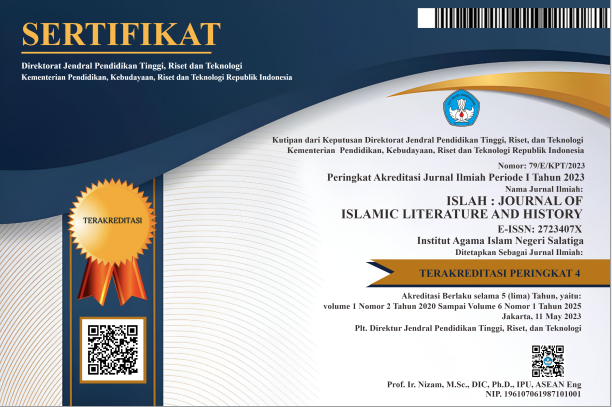Political Dynamic of The Era Pre-Prophetic 570-610 AD
(Contribution of The Political System in Islamic Civilization)
DOI:
https://doi.org/10.18326/islah.v5i1.71-96Keywords:
Political Dynamic, Pre-Prophetic, Islamic CivilizationAbstract
The Study of Islamic Civilization Pre-prophethic are very important to study in more depth. This is because these studies never stop being debated. The aim of this article is to understand 3 things: First, the political paradigm of the Pre-Prophetic Period. Second, internal and external factors that influenced the politics of the Pre-Prophetic Period. Third, the positive and negative implications of the politics of the Pre-Prophetic Period on Muslims. The method used is qualitative research with a literature review approach based on Mustika Zed theory. The data was collected using library research techniques and analyzed using collection, reduction, display and conclusion drawing techniques. The results found were 3 things: First, the political paradigm of the pre-prophetic period (570-610 AD) had 3 forms: (1) Absolute Monarchy (2) Oligarchy of Power (3) Tribal Confederation. Second, internally, there were 3 factors that influenced the politics of the pre-prophetic period: (1) Nepotism of the rulers (2) Patriarchy and social caste (3) conflict of interests of the rulers. Externally, there were 3 factors that influenced the politics of the pre-prophetic period: (1) Geographical location and economic system (2) limited natural resources (3) Arab war traditions. Third, there are 3 positive implications of pre-prophetic politics for Muslims: (1) Social cohesion within tribes (2) maintenance of local culture and traditions (3) Diversity of political systems. Meanwhile, there are 3 negative implications of pre-prophetic politics on Muslims: (1) conflict and war between tribes (2) discrimination and social inequality (3) lagging behind in economic development. The conclusion that this article shows is that it provides new views and insights into politics in the pre-prophetic period (570-610 AD).
References
Abdul Gani Jamora Nasution, Alfiah Khairani, Alliyah Putri, Muliana Fitri Lingga, Salsabila Saragih. “Mengenal Keadaan Alam, Keadaan Sosial, Dan Kebudayaan Masyarakat Arab Sebelum Islam Di Buku Ski Di Mi,” 2023, 31–41.
Amri, Khairul. “Sosiohistoris Masyarakat Arab Pra Islam.” Jurnal Mumtaz 2, no. 1 (2022): 1–7.
Aritonang. “History of Arabs.” Serambi, 2006, 1–23.
Assegaf, Abd. Rachman. Studi Islam Kontekstual (Elaborasi Paradigma Baru Muslim Kaffah). Surabaya: Gama Media, 2011.
Auzir, Mohd Haidzir Bin. “Tasawur Sosio-Politik Islam: Satu Analisis,” no. April (2017): 428–49.
Bagas Luay Ariziq. “Kedudukan Dan Kondisi Wanita Sebelum Dan Sesudah Datangnya Agama Islam.” Jurnal Keislaman 5, no. 1 (2022): 1–12. https://doi.org/10.54298/jk.v5i1.3398.
Bakar, Abu. “Peradaban Masyarakat Arab Sebelum Islam” 1 (2022): 57–66.
Basid, Abdul, Nur Faizin, Zhafira Qotrun Nada, and Savira Manzilina. “Kontribusi Doa Nabi Ibrahim Terhadap Perkembangan Perekonomian Arab Pra Islam – Pasca Islam (Studi Pemikiran Tafsir Ma’alim Al-Tanzil Karya Al-Baghawi).” Al Yasini : Jurnal Keislaman, Sosial, Hukum Dan Pendidikan 7, no. 1 (2022): 85. https://doi.org/10.55102/alyasini.v7i1.4620.
Biyanto. “Suksesi Kepemimpinan Arab Pra-Islam Dan Periode Al-Khulafa ’ Al-Rashidun” 1, no. 1 (2006): 76–85.
Darmawijaya, Edi. “Stratifikasi Sosial, Sistem Kekerabatan Dan Relasi Gender Masyarakat Arab Pra Islam.” Takammul : Jurnal Studi Gender Dan Islam Serta Perlindungan Anak 6, no. 2 (2017): 132–51. https://jurnal.ar-raniry.ac.id/index.php/takamul/article/view/1366.
Fahruddin, Ahmad Hanif. “LEARNING SOCIETY ARAB PRA ISLAM (Analisa Historis Dan Demografis).” KUTTAB 2, no. 1 (2017): 2–6. http://i-lib.ugm.ac.id/jurnal/download.php?dataId=2227%0A???%0Ahttps://ejournal.unisba.ac.id/index.php/kajian_akuntansi/article/view/3307%0Ahttp://publicacoes.cardiol.br/portal/ijcs/portugues/2018/v3103/pdf/3103009.pdf%0Ahttp://www.scielo.org.co/scielo.ph.
Haikal, Anjar Fikri, Mahmudah, and Kholid Mawardi. “Arab Pra-Islam (Sistem Politik Dan Kemasyarakatan Sistem Kepercayaan Dan Kebudayaan)” 06, no. 01 (2023): 1462–70. website: http://jonedu.org/index.php/joe.
Haris, Ahmad. “Nabi Muhammad Dan Reformasi Masyarakat Arab.” Jurnal Penelitian Sosial Keagamaan 21, no. 2 (2006): 1–21.
Hendra. “Misi Kerasulan Nabi Muhammad SAW (Strategi Politik Nabi SAW Dalam Berdakwah).” Al-Ittihad Jurnal Pemikiran Dan Hukum Islam 6, no. 2 (2020): 20–39.
Izza, Ismatul, Sinta Prayogi, and Debi Setiawati. “Diskriminasi Gender Pada Masa Pra Islam Terhadap Lahirnya Kesetaraan Gender.” Jurnal Sejarah Dan Pengajarannya 1, no. 2 (2016): 1–23.
Kasdi, Abdurrahman. “Genealogi Dan Sejarah Perkembangan Politik Islam.” Addin 9, no. 2 (2015): 277–308. https://doi.org/10.21043/addin.v9i2.616.
Khoir, Moh. Misbakhul. “Kultur Arab Dalam Hadis Pemimpin Negara Dari Suku Quraysh.” Mutawatir 4, no. 2 (2015): 243. https://doi.org/10.15642/mutawatir.2014.4.2.243-269.
Mardinal Tarigan, Natasha Olivia Ningrum, Ismail Aulia Siregar, Meiridha Utari Siregar, Manna Harahap. “Sejarah Peradaban Islam Arab Pra Islam.” Jurnal Pendidikan Dan Konseling 4, no. 11754202174 (2022): 1–14. https://www.academia.edu/9397541/Makalah_Sejarah_Peradaban_Islam_Arab_Pra_Islam.
Miharja, Jaya. “Sistem Aktivitas Ekonomi (Bisnis) Masyarakat Arab Pra-Islam.” El-Hikam 3, no. 1 (2010): 42–53.
Muannif Ridwan, Adrinus Chatib, Fuad Rahman. “Sejarah Makkah Dan Madinah Pada Awal Islam (Kajian Tentang Kondisi Geografis, Sosial Politik, Dan Hukum Serta Pengaruh Tradisi Arab Pra-Islam Terhadap Perkembangan Hukum Islam)” 10, no. 1 (2021): 6.
Mubarok, Ahmad Agis. “Sejarah Sosial-Politik Arab: Dari Hegemoni Romawi-Persia Hingga Kebangkitan Arab Islam.” NALAR: Jurnal Peradaban Dan Pemikiran Islam 4, no. 1 (2020): 64–76. https://doi.org/10.23971/njppi.v4i1.1879.
Mukharomah, Awwalina. “Kondisi Masyarakat Arab Pra Islam Dan Penerapan Metode Team Games Tourmament ( TGT ) Dalam Pembelajaran” 1, no. 3 (2023): 31–43.
Munfarida, Elya. “Perkawinan Menurut Masyarakat Arab Pra Islam Elya.” Historis 10, no. 2 (2015): 212–32.
Muzakki, Hawwin. “Konstruksi Sosial Dan Menggali Nilai-Nilai Positif Pada Masa Arab Pra Islam,” no. July (2020): 1–23.
Muzhiat, Aris. “Historiografi Arab Pra Islam.” Tsaqofah 17, no. 2 (2019): 129. https://doi.org/10.32678/tsaqofah.v17i2.3189.
Nasution, Abdul Gani Jamora, Adinda Rahmah Rangkuti, Manna Wassalwa, and Siti Amsarina Pangaribuan. “Narasi Tentang Kehidupan Masyarakat Arab Sebelum Islam Dalam Buku SKI Tingkat MI.” MUDABBIR Journal Reserch and Education Studies 2, no. 2 (2023): 122–34. https://doi.org/10.56832/mudabbir.v2i2.254.
Nasution, Gusniarti, Nabila Jannati, Violeta Inayah Pama, and Eniwati Khaidir. “Situasi Sosial Keagamaan Masyarakat Arab Pra Islam.” TSAQIFA NUSANTARA: Jurnal Pembelajaran Dan Isu-Isu Sosial 1, no. 1 (2022): 85. https://doi.org/10.24014/tsaqifa.v1i1.16541.
Rahmadi. Pengantar Metodologi Penelitian. Banjarmasin:Antasari Press, 2011.
Sandu Siyoto, Muhammad Ali Sodik. Dasar Metodologi Penelitian. Yogyakarta: Literasi Media Publishing, 2015.
Satir, Muhammad. “Kehidupan Sosial Masyarakat Arab Masa Awal Kehadiran Pendidikan Islam.” AL-FIKR: Jurnal Pendidikan Islam 5, no. 1 (2019): 39–48. https://doi.org/10.32489/alfikr.v5i1.17.
Sudirman P, Sudirman P, Firdaus Firdaus, Muh. Anis, Jamaluddin Jamaluddin, and Suriyati Suriyati. “Islamic Political Theory during the Abbasid Government and Its Implications Toward Education.” In Proceedings of the 2nd Borobudur International Symposium on Humanities and Social Sciences, BIS-HSS 2020, 18 November 2020, Magelang, Central Java, Indonesia., 2021. https://doi.org/http://dx.doi.org/10.4108/eai.18-11-2020.2311803.
Tamam, B. “Nabi Muhammad Pra Dan Pasca Kenabian: Proses Pembentukan Pribadi Luhur Dan Karakter Agung Sang Rasul.” Al-Dhikra| Jurnal Studi Qur’an Dan Hadis 2, no. 1 (2020): 105–22. http://journal.ushuluddin.ptiq.ac.id/index.php/aldhikra/article/view/8.
Umar. “Pemikiran Politik Era Kenabian, Sahabat Dan Sekte- Sekte Islam: Tinjauan Sketsa Historisitas.” MIMBAR 5, no. 2 (2019): 16–42.
Yahya, Yuangga Kurnia. “Pengaruh Penyebaran Islam Di Timur Tengah Dan Afrika Utara: Studi Geobudaya Dan Geopolitik.” Al-Tsaqafa: Jurnal Peradaban Islam 1, no. 2 (2019): 274–82.
Zed, Mestika. Metode Penelitian Kepustakaan. Jakarta: Yayasan Pustaka Obor Indonesia, 2014.
Downloads
Published
Issue
Section
License
Copyright (c) 2024 Novan Ferdiansyah, Zulfi Mubaraq, Nur Kholid, Maimun, Fini Adila Kurnia

This work is licensed under a Creative Commons Attribution-ShareAlike 4.0 International License.
Copyright
Authors retain copyright and grant the journal right of first publication with the work simultaneously licensed under a Creative Commons Attribution-ShareAlike 4.0 International License. In line with the license, authors are allowed to share and adapt the material. In addition, the material must be given appropriate credit, provided with a link to the license, and indicated if changes were made. If authors remix, transform or build upon the material, authors must distribute their contributions under the same license as the original.
Licensing

This work is licensed under a Creative Commons Attribution-ShareAlike 4.0 International License.








